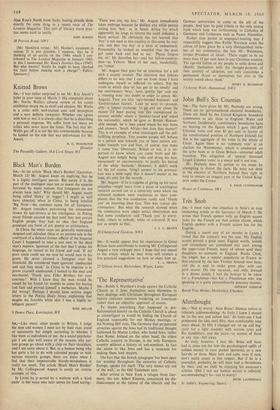Sut,—Like many other people in Britain, I judge the men
and women I meet not by their race, creed or nationality but simply according to whether I like them as individuals or not. As a social psycholo- gist I am also well aware of the reasons why cer- tain groups go about with a chip on their shoulders, and 1 am sorry about it. But, as a human being who has quite a lot to do with coloured people or with various minority groups, there are times when I feel that their impenetrable bloody-mindedness is really too much. The article 'Black Man's Burden' by Mr. Collingwood August is surely an outsize example of this.
In Lyons he is served by a waitress with a 'kind smile' in her voice who later serves his food saying: 'There you are, my boy.' Mr. August immediately takes umbrage because he dislikes any white person calling him 'boy,' as in South Africa (to which apparently he longs to return) the word indicates a black servant. He obviously has not learned that 'boy' is not used in this country in this sense by any= one, and that 'my boy' is a term of 'endearment. Presumably he looked so resentful that the poor girl came back and had to say: 'Please forgive me, sir.' He describes her—and her fellow-country- men—as Yahoos. Most of her race, incidentally, are 'rotten.'
Mr. August then goes for an interview for a job with a county council. The interview that follows differs in no way that I can see from those I have undergone myself or inflicted on others. Yet the room in which they sit has got to be 'smelly' and the interviewers 'bray,' have 'gorilla lips' and one a 'running nose' (no doubt in order to annoy Mr. August). They are also 'ugly-minded buzzards' and 'God-forsaken fascists.' Later he went to—presum- ably—a labour exchange 'to go and sec about the money I'd been paying into this unemployed in- surance swindle' where a 'monkey-faced god' asked his nationality, which he gave as British. Reason- ably enough. he is then asked where he was born, and answers, 'South Africa—but does that matter?' This is an example of what sociologists call the self- fulfilling prophecy. You assume people will behave in a certain way towards you or have certain atti- tudes towards you and then, of course, you make it come true. Obviously, British or not, it is im- portant to know where you come from and Mr. August was simply being rude and doing his best, Consciously or unconsciously, to justify his hatred of the white 'bastards.' However, it didn't work for the (of course, 'lying') answer to his provoca- tion was a mild reply that it doesn't matter in the least, it's only for the records. . . .
Mr. August—if he is capable of giving up his racial prejudice—might learn from a piece of sociological research carried out in a university town where the coloured students were vociferous in their com- plaints that the bus conductors rarely said 'Thank you' on receiving their fare. This was 'colour dis- crimination.' But what the research showed when the conductors were under actual observation was that some conductors said 'Thank you' to every- body, others to nobody, white or coloured. It was just as simple as that.


































 Previous page
Previous page